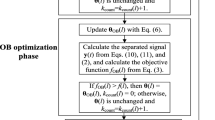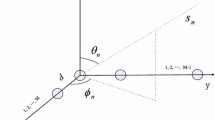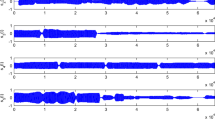Abstract
It is difficult to solve the problem of underdetermined blind source separation (UBSS) since the mixing system is not invertible. Therefore, estimating the underdetermined mixing matrix becomes the most crucial step in the well-known “two-step approach”. To improve the estimation performance, this paper proposes a novel clustering analysis method combining artificial bee colony (ABC) optimization with single-source-point (SSP) detection. The observed signals in the time domain are first transformed into sparse signals in the time-frequency domain by a short time Fourier transform (STFT). And the SSP detection is performed to enhance the sparsity of the signals, and the linear clustering of sparse signal is also converted into compact clustering by mirroring mapping in order to find the corresponding clustering centers in the dense data piles. The clustering centers correspond to the column vectors of the mixing matrix, so the mixing matrix can be estimated by cluster analysis. In the estimation process, the global search capability of the ABC algorithm is fully utilized. Based on the linear clustering characteristics of sparse signals, a new search strategy combining deterministic search with stochastic search is used for bee colony to alleviate the contradiction between the population diversity and the convergence speed of the algorithm. Considering the fact that the ABC algorithm has poor local exploitation capacity, a local search strategy based on Levy flight is also used to further search the neighborhood of the current optimal solution, which can significantly improve the local exploitation performance of the algorithm. The simulation results show that the proposed method can not only estimate the underdetermined mixing matrix (and the source signals) more accurately, but also provide a more robust estimator.










Similar content being viewed by others
References
Ambrois C, Dehman A, Neuvial P, Rigall G, Vialaneix N (2019) Adjacency-constrained hierarchical clustering of a band similarity matrix with application to genomics. Algorithms Mol Biol 14(22):1–14
Arberet S, Gribonval R, Bimbot F (2010) A robust method to count and locate audio sources in a multichannel underdetermined mixture. IEEE Trans Signal Process 58(1):121–133
Banharnsakun B, Achalakul T, Sirinaovakul B (2010) The best-so-far selection in artificial bee colony algorithm. Appl Soft Comput 11:2888–2901
Bofill P, Zibulevsky M (2001) Underdetermined blind source separation using sparse representations. Signal Process 81:2353–2362
Bouchard F, Malick J, Congedo M (2018) Riemannian optimization and approximate joint diagonalization for blind source separation. IEEE Trans Signal Process 66(8):2041–2054
Carabias-Orti JJ, Nikunen J, Virtanen T, Vera-Candeas P (2018) Multichannel blind sound source separation using spatial covariance model with level and time differences and nonnegative matrix factorization. IEEE/ACM Trans Audio Speech Lang Process 26(9):1512–1527
Chakraborty R, Sushil R, Garg ML (2019) Hyper-spectral image segmentation using an improved PSO aided with multilevel fuzzy entropy. Multimed Tools Appl 78:34024–34063
Chen YQ, Li YX, Zhou J (2018) Mixing matrix estimation in underdetermined blind source separation based on single source points detection. Proceedings of 18th IEEE International Conference on Communication Technology 1077-1081
Chen YQ, Li YX, Zhou J (2018) Mixing matrix estimation in underdetermined blind source separation based on objective function and artificial bee colony algorithm. Proceedings of 18th IEEE International Conference on Communication Technology 1063-1066
Comon P, Jutten C (2010) Handbook of blind source separation: independent component analysis and applications. Academic Press. ISBN: 978-0-12-374726-6
Domanov I, De Lathauwer L (2016) Generic uniqueness of a structured matrix factorization and applications in blind source separation. IEEE J Sel Topics Signal Process 10(4):701–71105
Hakli H, Uguz H (2014) A novel particle swarm optimization algorithm with levy flight. Appl Soft Comput 23:333–345
Han HG, Wu XL, Zhang L, Tian Y, Qiao JF (2019) Self-organizing RBF neural network using an adaptive gradient multiobjective particle swarm optimization. IEEE Trans Cybern 49(1):59–82
He XS, Wang F, Cai WB, Wu LM (2013) Ant colony clustering algorithm for underdetermined BSS. Chin J Electron 22(2):319–324
He XS, He F, Cai WH (2016) Underdetermined BSS based on K-means and AP clustering. Circuits Syst Signal Process 35(8):2881–2913
He J, Chen Y, Zhang QH, Sun G, Hu Q (2018) Blind source separation method for bearing vibration signals. IEEE Access 6:658–664
Kameoka H, Higuchi T, Tanaka M, Li L (2018) Nonnegative matrix factorization with basis clustering using cepstral distance regularization. IEEE/ACM Trans Audio Speech Lang Process 26(6):1029–1040
Karaboga D, Akay B (2009) A comparative study of artificial bee colony algorithm. Appl Math Comput 214:108–132
Karaboga D, Ozturk C (2011) A novel clustering approach: artificial bee colony (ABC) algorithm. Appl Soft Comput 11:652–657
Karfoul A, Albera L, Birot G (2010) Blind underdetermined mixture identification by joint canonical decomposition of HO cumulants. IEEE Trans Signal Process 58(2):638–649
Li Y, Yu ZL, Bi N, Xu Y, Gu Z, Amari SI (2014) Sparse representation for brain signal processing. IEEE Signal Process Mag 31(3):96–106
Ozerov A, Févotte C (2010) Multichannel nonnegative matrix factorization in convolutive mixtures for audio source separation. IEEE Signal Process Mag 18(3):550–563
Qin Z, Fan J, Liu Y, Gao Y, Li GY (2018) Sparse representation for wireless communications. IEEE Signal Process Mag 35(1):40–58
Reju VG, Koh SN, Soon IY (2009) An algorithm for mixing matrix estimation in instantaneous blind source separation. Signal Process 89:1762–1773
Reju VG, Koh SN, Soon IY (2010) Underdetermined convolutive blind source separation via time-frequency masking. IEEE Trans Audio Speech Lang Process 18(1):101–116
Slowik A, Kwasnickn H (2018) Nature inspired methods and their industry applications--swarm intelligence algorithms. IEEE Trans Ind Inf 14(3):1004–1015
Tengtrairat N, Woo WL, Dlay SS, Gao B (2016) Online noisy single-channel source separation using adaptive spectrum amplitude estimator and masking. IEEE Trans Signal Process 64(7):1881–1895
Yang XS, Deb S (2009) Cuckoo search via levy flights. Proceedings of 2009 world Congress on Nature & Biologically Inspired Computing 210-214
Zayyani H, Babaie-Zadeh M, Jutten C (2009) An iterative Bayesian algorithm for sparse component analysis in presence of noise. IEEE Trans Signal Process 57(11):4378–4390
Zhang C, Ouyang D, Ning J (2010) An artificial bee colony approach for clustering. Expert Syst Appl 37:4761–4767
Acknowledgments
Funding for this work was supported by the National Natural Science Foundation of China [No. 60572183].
Author information
Authors and Affiliations
Corresponding author
Additional information
Publisher’s note
Springer Nature remains neutral with regard to jurisdictional claims in published maps and institutional affiliations.
Rights and permissions
About this article
Cite this article
He, X., He, F. Underdetermined mixing matrix estimation based on artificial bee colony optimization and single-source-point detection. Multimed Tools Appl 79, 13061–13087 (2020). https://doi.org/10.1007/s11042-020-08635-w
Received:
Revised:
Accepted:
Published:
Issue Date:
DOI: https://doi.org/10.1007/s11042-020-08635-w




